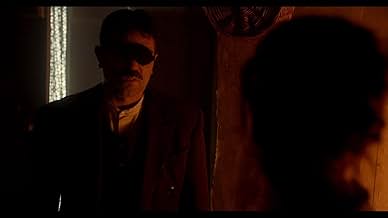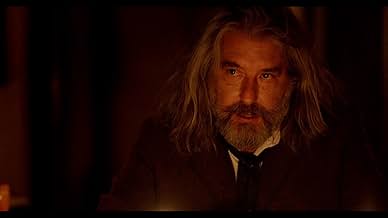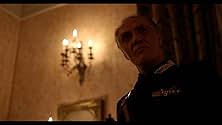IMDb RATING
4.4/10
1.7K
YOUR RATING
WWI has ended but events surrounding the first free election in Italy threaten to tear the village apart. Padre Pio struggles with his own personal demons, ultimately emerging to become one ... Read allWWI has ended but events surrounding the first free election in Italy threaten to tear the village apart. Padre Pio struggles with his own personal demons, ultimately emerging to become one of Catholicism's most venerated figures.WWI has ended but events surrounding the first free election in Italy threaten to tear the village apart. Padre Pio struggles with his own personal demons, ultimately emerging to become one of Catholicism's most venerated figures.
- Director
- Writers
- Stars
- Awards
- 1 win & 1 nomination total
- Director
- Writers
- All cast & crew
- Production, box office & more at IMDbPro
Featured reviews
Not sure why it's called Padre pio, it barely showed him. Even then it showed him in a bad light. Bad music score, camera work, really nothing redeeming about it.
It's like watching a really bad movie with a fee clips of a worse movie popping it.
Why not make a movie that actually shows him, the stigmata, lines of people coming to confess to him, his ability to read what was bothering people at confessions.
Why put in the nudity and profanity? Why use his name to promote this boring garbage.
We thought it would be good after hearing about LaBeouf converting it would be good. It's not remotely that.
It's like watching a really bad movie with a fee clips of a worse movie popping it.
Why not make a movie that actually shows him, the stigmata, lines of people coming to confess to him, his ability to read what was bothering people at confessions.
Why put in the nudity and profanity? Why use his name to promote this boring garbage.
We thought it would be good after hearing about LaBeouf converting it would be good. It's not remotely that.
So this has to be by far the most disappointing film I've seen in 2023. Why? I was so looking forward to this film for over a year before its release, expecting some semblance of a Padre Pio biopic. What I got instead? A completely different film whose plot involved the struggle of communists vs fascists in a small provincial Italian town, with Padre Pio being an incidental character who wasn't relevant to the plot AT ALL. In fact, had it not been for the last few seconds of the film's ending where they show him getting the stigmata, Padre Pio could have literally been interchanged with any generic provincial Italian friar. I'd even go a step further: if all his scenes were deleted from the film, it would not have changed the plot in the slightest whit. I would have at least been a bit more forgiving if they had taken 'artistic liberties' with telling Padre Pio's life, as some over-enthusiastic biopics tend to do.... but they didn't even do that! They do not discuss, flesh out, or even relay the tiniest iota of the story of Padre Pio... he is merely an incidental and inconsequential character in a story involving the early struggles of Italian partisans against the nascent fascists. I'm not saying that there is anything inherently wrong with that type of story (though truth be told, even that was bland and uninteresting), but if that was the main point and intent of the film, then the filmmakers should have been up front about it, and shouldn't have duped the audience by disguising this as having anything remotely to do with Padre Pio. Shame, as Padre Pio's story is fascinating on its own, and actually TELLING his story would have been immensely more interesting than this insipid drivel we were given here.
I was not expecting much reverence for the subject matter in a film by Abel Ferrara, whose latest film was about the Vatican blowing up. Ferrara seems to be his own audience these days.
Nevertheless, Shia Labeouf's publicized conversion to Catholicism did spark some interest (though I thought he already did this for "Fury"). However, my nose was still very well plugged, and it remained so. This is not a biography. It is just empty, with no real direction in story, nor any perceivable goal. The shark in "Jaws" was better utilized than Saint Pio was in this film; at least the shark was central to the plot, and his presence was felt- even when he was offscreen.
Ferrara's other films are brutal, unrelenting, dark and negative, and yet utilize Catholic imagery as little more than window dressing. Such is the case with this film, only its also part of the title. Don't waste your time. Watch "Padre Pio: Miracle Man" or "Padre Pio: Between Heaven and Earth," instead.
Nevertheless, Shia Labeouf's publicized conversion to Catholicism did spark some interest (though I thought he already did this for "Fury"). However, my nose was still very well plugged, and it remained so. This is not a biography. It is just empty, with no real direction in story, nor any perceivable goal. The shark in "Jaws" was better utilized than Saint Pio was in this film; at least the shark was central to the plot, and his presence was felt- even when he was offscreen.
Ferrara's other films are brutal, unrelenting, dark and negative, and yet utilize Catholic imagery as little more than window dressing. Such is the case with this film, only its also part of the title. Don't waste your time. Watch "Padre Pio: Miracle Man" or "Padre Pio: Between Heaven and Earth," instead.
Such a disappointment. Literally 20 minutes of the film contains Padre Pio. This movie focuses on political issues in Italy rather than Padre Pio. The film was boring & lacked any points of interest. Crew had no idea the talent in Shia LeBouf, who did a phenomenal job as Padre Pio. He wasn't given anywhere near enough screen time or enough opportunity to portray Padre Pio. Nudity in a film about the greatest saint of our time is so sacreligious & disrespectful to the man that is Padre Pio as well as his religion. This is an injustice to Padre Pio & such a bust. LeBouf was phenomenal, storyline was awful.
The First World War has just ended, but peace is far from the Italian village of San Giovanni Rotondo. As families welcome back their loved ones from the battlefield, a new conflict brews between the socialist peasants and their oppressive landowners. Meanwhile, in the village convent, Capuchin friar Padre Pio is having a crisis of faith. Encountering demons and suffering from vivid, dark hallucinations, will the friar overcome his troubles, and will the villagers find their freedom?
Directed by Abel Ferrara, 'Padre Pio' is a witless Frankenstein's monster: a strange, plodding drama that feels like two vastly different films spliced poorly together; neither of which are very good. Written by Ferrara and Maurizio Braucci- alongside whom Ferrara wrote the far more interesting 'Pasolini'- the film aims to explore themes of spirituality and politics in post-war Italy, but ends up saying nothing at all. The links between the story involving the villagers and the one concerning the titular character are tenuous and poorly explained, while the complete package is so slow and tedious it would be more worthwhile watching paint dry.
Moreover, the dialogue is stilted and cliched, with the villagers' arguments for and against socialism being especially trite and banal. Often, it sounds like bad improvisation- and the fact that the mostly Italian cast struggle to deliver their lines in English doesn't help matters. Additionally, although Ferrara tries to juxtapose the suffering of Pio with that of the villagers, it doesn't work, feeling ham-fisted at best. Furthermore, his portrayal of the friar isn't sympathetic, nor interesting, with no backstory or characterisation. There's no reason to root for him, and his dull journey towards stigmata simply isn't engaging.
Having said that, there are moments throughout that hold interest, even if they're too few and far between. An all-too-short scene involving a character confessing his lust for his daughter brims with an intriguing menace, while the opening sequence- in which soldiers return from the war- is well realized, with minimal dialogue. Unfortunately, scenes like those are rare gems in a sea of mediocrity, and the majority of the narrative is a slog.
On the other hand, Alessandro Abate's muted cinematography adds a dose of realism to proceedings, and is consistently striking. Tommaso Ortino's production design lends additional authenticity to the picture, while the set and costume design is of a particularly high quality. However, Joe Delia's score- incorporating, at one point, Southern chain-gang music- is overblown, lacking subtlety or power.
Shia La Beouf stars as the titular character, delivering a performance of staggering self-indulgence, going so over-the-top he makes Nicolas Cage in 'Vampire's Kiss' look like a masterpiece of understatement. It is a misjudged attempt to outdo Daniel Day-Lewis in the intensity department, making Padre Pio look petulant, insane and dour. His Italian co-stars all do more nuanced work, but the impact of their performances are severely hampered by their having to speak in English. Worth mentioning, however, is Asia Argento, who plays the incestuous father, injecting some much-needed energy into a lifeless film.
In conclusion, Abel Ferrara's 'Padre Pio' is a failure, both as a biopic of the titular character and as a drama concerning Italian socio-political history. Drab, dull and disappointing, the narrative lacks wit, insight and entertainment value, while the dialogue is consistently contrived and unnatural. While the cinematography and production design are commendable, the score is poor and the central performance from Shia LaBeouf is terribly over-the-top. In short, it's a boring waste of time, deserving Three Hail Marys, and nothing more.
Directed by Abel Ferrara, 'Padre Pio' is a witless Frankenstein's monster: a strange, plodding drama that feels like two vastly different films spliced poorly together; neither of which are very good. Written by Ferrara and Maurizio Braucci- alongside whom Ferrara wrote the far more interesting 'Pasolini'- the film aims to explore themes of spirituality and politics in post-war Italy, but ends up saying nothing at all. The links between the story involving the villagers and the one concerning the titular character are tenuous and poorly explained, while the complete package is so slow and tedious it would be more worthwhile watching paint dry.
Moreover, the dialogue is stilted and cliched, with the villagers' arguments for and against socialism being especially trite and banal. Often, it sounds like bad improvisation- and the fact that the mostly Italian cast struggle to deliver their lines in English doesn't help matters. Additionally, although Ferrara tries to juxtapose the suffering of Pio with that of the villagers, it doesn't work, feeling ham-fisted at best. Furthermore, his portrayal of the friar isn't sympathetic, nor interesting, with no backstory or characterisation. There's no reason to root for him, and his dull journey towards stigmata simply isn't engaging.
Having said that, there are moments throughout that hold interest, even if they're too few and far between. An all-too-short scene involving a character confessing his lust for his daughter brims with an intriguing menace, while the opening sequence- in which soldiers return from the war- is well realized, with minimal dialogue. Unfortunately, scenes like those are rare gems in a sea of mediocrity, and the majority of the narrative is a slog.
On the other hand, Alessandro Abate's muted cinematography adds a dose of realism to proceedings, and is consistently striking. Tommaso Ortino's production design lends additional authenticity to the picture, while the set and costume design is of a particularly high quality. However, Joe Delia's score- incorporating, at one point, Southern chain-gang music- is overblown, lacking subtlety or power.
Shia La Beouf stars as the titular character, delivering a performance of staggering self-indulgence, going so over-the-top he makes Nicolas Cage in 'Vampire's Kiss' look like a masterpiece of understatement. It is a misjudged attempt to outdo Daniel Day-Lewis in the intensity department, making Padre Pio look petulant, insane and dour. His Italian co-stars all do more nuanced work, but the impact of their performances are severely hampered by their having to speak in English. Worth mentioning, however, is Asia Argento, who plays the incestuous father, injecting some much-needed energy into a lifeless film.
In conclusion, Abel Ferrara's 'Padre Pio' is a failure, both as a biopic of the titular character and as a drama concerning Italian socio-political history. Drab, dull and disappointing, the narrative lacks wit, insight and entertainment value, while the dialogue is consistently contrived and unnatural. While the cinematography and production design are commendable, the score is poor and the central performance from Shia LaBeouf is terribly over-the-top. In short, it's a boring waste of time, deserving Three Hail Marys, and nothing more.
Did you know
- TriviaThe filming locations are places Padre Pio lived or visited.
- How long is Padre Pio?Powered by Alexa
Details
Box office
- Gross worldwide
- $12,100
- Runtime
- 1h 44m(104 min)
- Color
Contribute to this page
Suggest an edit or add missing content


























